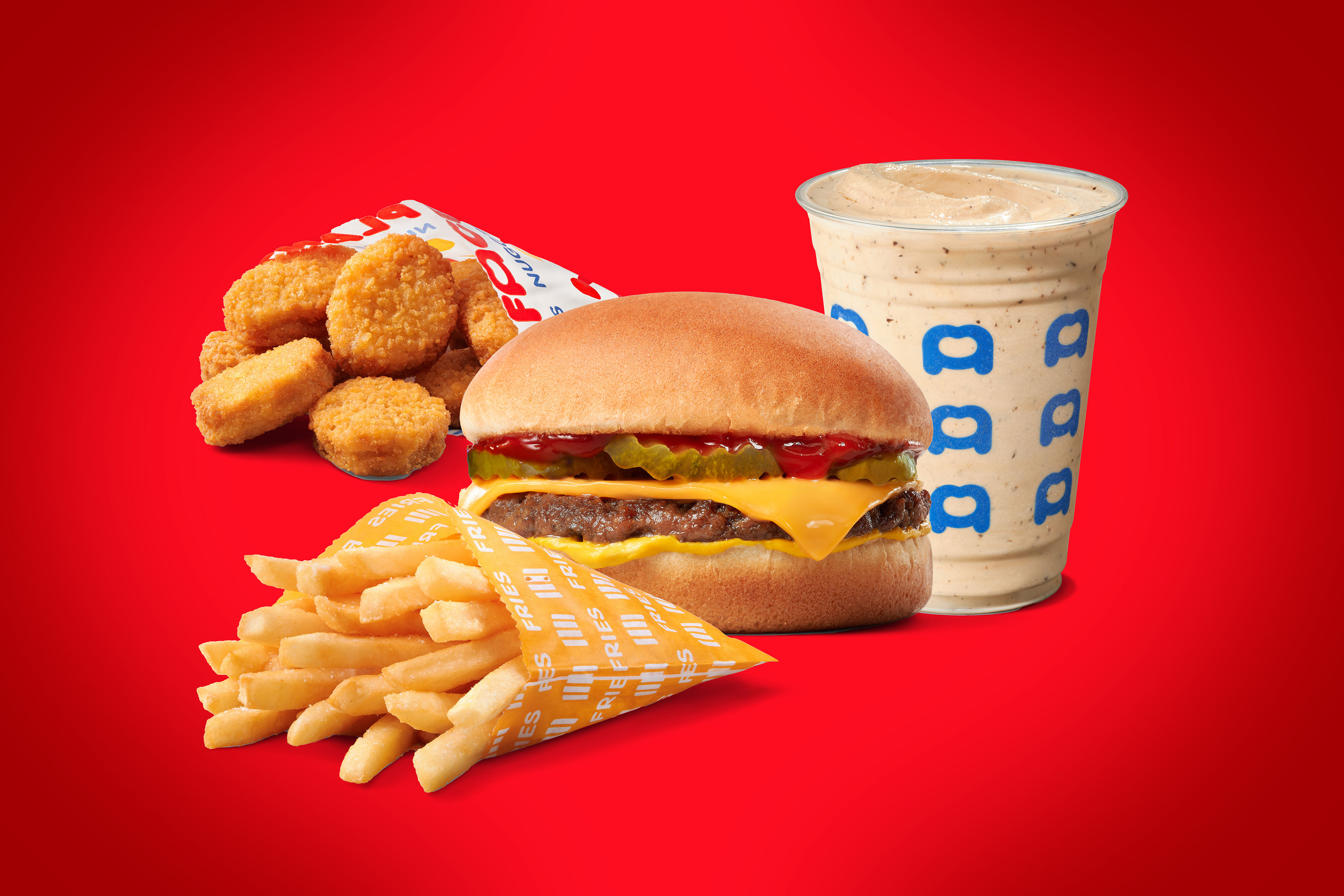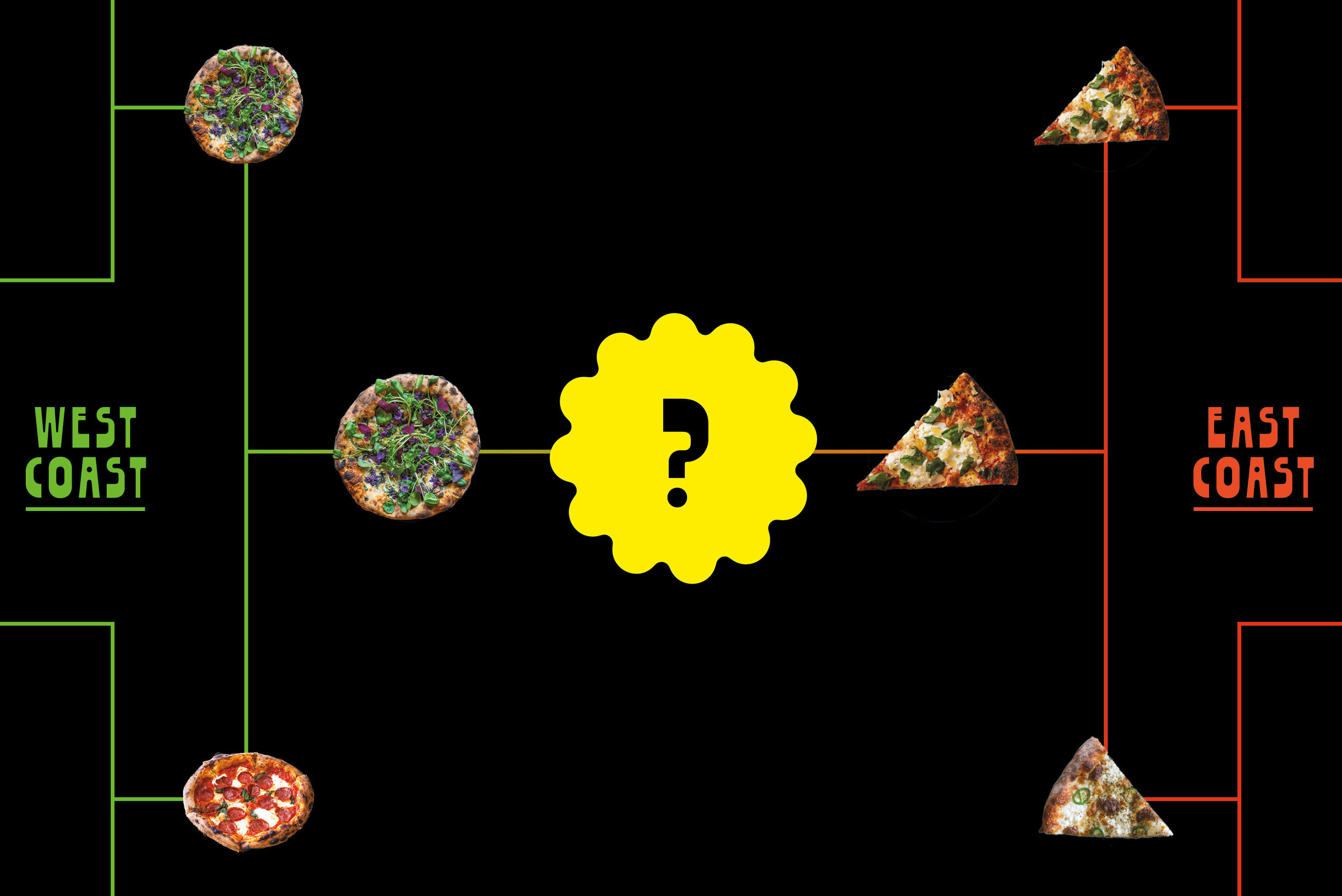The Rise of Portland's Iconoclastic Asian Cuisine
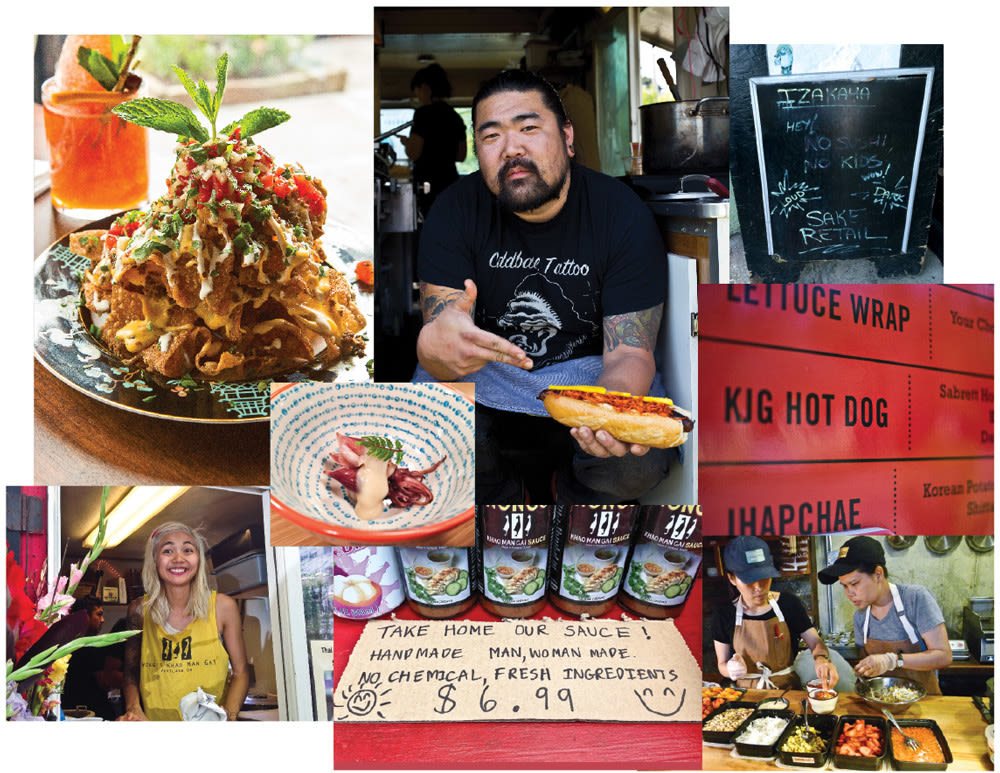
Clockwise from top left: Expatriate’s wonton nacho; Kim Jong Grillin’ owner Han Ly Hwang; Sandwich board at Tanuki; Kim Jong Grillin's menu; Langbaan’s Thai open kitchen; Nong Poonsukwattana and her namesake sauce; Nodoguro’s wild firefly squid with white miso sauce
You can be forgiven for doing a double take when entering Chizu, a dead ringer for a sushi bar. Shoji lights, tall stools, and a walnut counter dominate the downtown space, as origami cranes soar above. Two steps in, it hits you: Chizu is Japanese for cheese. Instead of raw fish, counter cases gleam with wedges treated like Tiffany jewels, sliced to order, then paired with exacting condiments. Sushi, the epitome of the perfect bite, is merely the inspiration for one man’s mission to share his 20-year cheese odyssey. Grab a sake and revel in owner Steve Jones’s fan-boy enthusiasm. It’s all of Portland’s fun and geekery, filtered through a Japanese aesthetic.
Japan also guest stars at Nodoguro, a rising destination for rigorous Japanese cuisine in a parlor-game milieu. For a recent dinner detour to Twin Peaks, owners Ryan and Elena Roadhouse transformed their Hawthorne chef’s counter into a mock sheriff’s office. Menus, tucked inside fake FBI folders on the Laura Palmer case, flashed wordplays from David Lynch’s cult Northwest noir TV show. Diners dug into doughnuts, “Coffee Cup Custard” (mugs of savory chawanmushi custard and coffee-black mushroom gel), and silky cod splashed with dashi poured from a coffee pot, riffing off the show’s fish-in-a-percolator scene. Naturally, one customer showed up as the Log Lady, lumber in tow.
These two tremors mark something I’ve noticed, a deeper shift in Portland’s food tectonics. Finally, our own distinctive take on Asian cuisine is evolving—improvisational, cheeky, layered in meta-reference, often willfully inauthentic, and beholden to flavor above all. It’s not Asia, it’s alt-Asia.
Relatively small and still primarily white, Portland doesn’t match the Eastern promise of other West Coast food metropolises. Vancouver, British Columbia, is the destination for galactic-class dim sum; San Francisco rewards ramen crawlers and boba tea hoppers; LA, where Asian cultures define entire zip codes, prompts biblical arguments over the best soup dumplings and hot pots. Portland simply lacks the essential demand-and-supply equation (large immigrant base, an influx of highly skilled immigrant chefs) that feeds such competition. In recent years, we’ve traded a faded Chinatown for a fast-growing SE 82nd Avenue Asian food community, where a chowhound can glimpse authentic greatness amid Pizza Huts and auto lots. Witness: Ha & VL’s meticulous soups and celestial iced coffee—the best this side of Saigon. (True to Portland’s love of the limited edition, the Luu-Voung clan offers two soups daily, often sold out by noon.)
But beyond 82nd, a more expansive vision of Portland’s Asian food personality is emerging, helter skelter, in a dozen or more places around town united only by their willingness to dig deep, experiment, and create their own worlds. In Portland, as it turns out, “Asian” food can mean anything from one hyperspecific recipe to a repertoire of spices, or even just a wholesale state of mind.
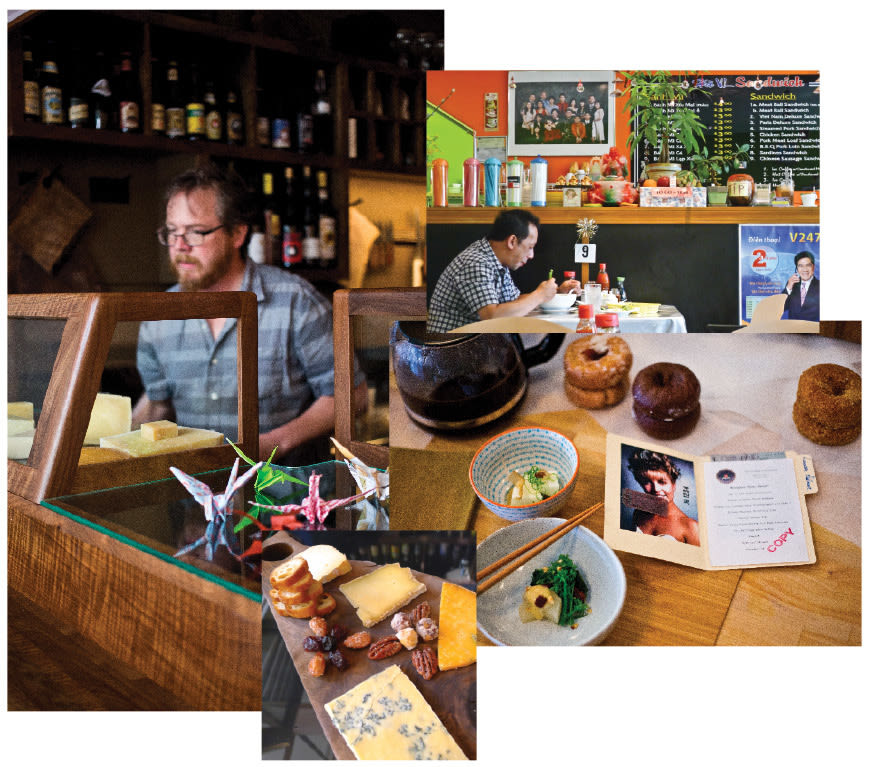
Clockwise from left: Steve Jones at Chizu; legit Vietnamese soups at HA & VL; Nodoguro’s Twin Peaks dinner; a Chizu omakase board.
Slaying stereotypes appears to be one of the tenets of these alt-Asian food acolytes. At Alberta’s globe-trotting Aviary, the city’s best Chinese hum bao swagger to the table with Portland’s
favorite ingredient: foie gras. In the Central Eastside, Biwa’s new sister spot Noraneko recasts the Japanese ramen den as a health-food cocktail bar, where light broths can be chased with a carrot juice or roasted brown rice cream soda good enough to shame a Dr. Brown’s. Owner Gabe Rosen’s outsize dream: “to go bigger and deeper than anyone in Chinese tea service.” And then there’s Kim Jong Grillin’ food cart owner Han Ly Hwang’s audacious Korea-meets-Americana gut busters: “Dear Leader” pizza heaving with kimchi, blue cheese, and satire, or, perhaps, spicy daikon-draped hot dogs.
Arguably, our appetite for all this adventure wouldn’t exist without Andy Ricker, whose now-famous Pok Pok opened in 2006 with an unwavering commitment to Thai street food—no shortcuts, no Western compromises. He didn’t set out to create a foodie’s paradise. He just found his holy food grail and wanted to share it. Ricker’s exotic campout on SE Division Street distills his quest into a place fizzing with drinking vinegars, Bangkok game birds, Asian rock, and twinkling Christmas lights. It’s a remarkable vision of there, transported here.
For a new generation of cooks, Pok Pok proved that diners would ditch comfort zones for an eating experience grounded in damn good food. Ricker’s true grit inspired former Pok Pok cook Nong Poonsukwattana to gamble on a food cart and an old-school bundle of Thai chicken and rice. Now, among Portland’s flock of pavement gourmets, Nong’s Khao Man Gai rules the roost.
Bangkok native Akkapong “Earl” Ninsom, 36, showed where else this thinking can lead: his backroom restaurant Langbaan (Portland Monthly’s 2014 Restaurant of the Year) is breaking new ground as a nationally lauded synthesis of Thailand and Portland, mashing vintage Thai recipes, casually ceremonious fine dining, farmers market acuity, and the allure of secret spaces. In March, GQ slotted Langbaan at no. 2 on its best new restaurants list. America’s toughest cookie, Gourmet legend editor Ruth Reichl, also forked in, exclaiming one night last fall over an herb-strewn plate, “This—this is what I remember from Thailand. There’s nothing like it in New York.”
“People in Portland appreciate the genuine yet creative,” Ninsom told me recently. “Other cities may or may not like it. What matters is that Portland does.”
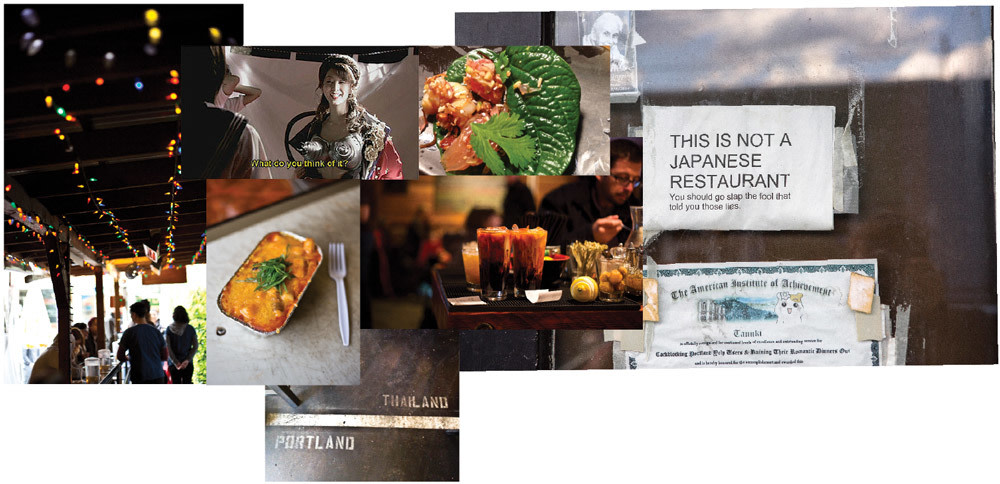
Clockwise from left: Pok Pok’s transportive Xmas lights; a still from one of Tanuki’s bar film picks, Japanese gore flick, Machine Girl; Langbaan’s miang som betel leaf bundles; Tanuki’s front-door warning; Pok Pok’s Thai iced coffee; Langbaan’s spray-painted “welcome mat”; KJG’s off-menu spicy Korean “mac n cheese”
If tenacity is the bone of Portland’s Asian-inspired restaurants, booze is the marrow—a comment, perhaps, on our city’s thirst for dive-bar culture, local distilleries, and curated everything. Look only to the city’s proliferation of “drinking-food spots,” a quirky colloquialism and riff on Asia’s izakayas and bia hoi stalls, where snacks are an essential partner to good sips. The raucous template dates back to seven-year-old Tanuki, where cranky chef/ringleader Janis Martin lets loose a keen interest in Asian beers, Okinawan awamori liqueur, and sake to pair with omakase inside a nearly pitch-black, punk-rock Montavilla storefront that greets you with signs screaming: “No sushi, no kids” and “This is not a Japanese restaurant.”
Tanuki’s ambient light comes courtesy of gore-spurting Japanese revenge-fantasy flicks on the TV, which often send diners into fits of giggles and cringes. Recently, somewhere between the fish-sauce Cracker Jack and sumptuous kimchi mac and cheese, I watched as, onscreen, a woman in a buzz-saw bra made mincemeat of an enemy. And then I had another drink.
Over at Northeast bar Expatriate, James Beard medalist Naomi Pomeroy rips into Asia’s spice cabinet with wit and fury. Her “drinking menu” brims with dreamy Burmese coconut noodles, a perfectionist’s shrimp toast, and, everywhere, chiles hot enough to singe your eyebrows. It matches the room’s “Forget it, Jake, it’s Chinatown” vibe and the High Fidelity–level vinyl collection from partner Kyle Linden Webster. Bonus: the most awesome nachos on the planet, crunched up with fried wonton-skin chips, curried pork crumbles, fiery salsa, bright herbs galore, and, yes, spicy Velveeta cheese.
Back at Nodoguro, a new concept, “Hardcore Omakase Sushi,” is suddenly the city’s hottest reservation (Sunday nights only). Diners plunk down a set fee for wild finds from Japan’s famed fish markets, crafted with expert slicing that could make even Jiro dream of Portland. Japanese-fluent, Spanish-Canadian chef Ryan Roadhouse, 36, has worked in Japanese restaurants since his teens. The whole journey, he told me one afternoon, has been fueled by the authenticity question ... until now: “Something new is happening. I’m doing Japanese techniques, but I’m finding my own voice. It’s more creative and less self-conscious.” At the night’s end, the “Captain’s Table” commences, as diners shout out requests for seconds of any dish, a Nodoguro ritual suggested by a customer known as John the Bastard.
Japan, for one, is reciprocating our crush on its food and culture. Cool-kid Japanese tourists and magazine editors are flocking to Portland in search of raw authenticity and handcrafted philosophies. Now, in Tokyo’s Harajuku District, corporate lifestyle store “Niko ... and Tokyo” is riffing on us: A spiffy homage to Navarre, Portland’s most eccentric plunge into the farm-to-table ethos, sits on the second floor, complete with chairs stacked with produce. The goal is to transplant chef John Taboada’s vision of seasonality in an urban city, drawing from Toyko’s growers.
“They’re where Portland was 10 years ago,” muses Taboada, the project’s consultant. “I e-mailed the cooks and asked what was in season. They sent me a picture of a cow.” Clearly, we’re all evolving—together.

